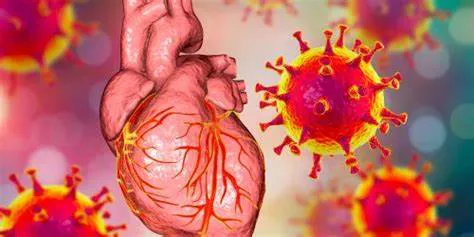Myocarditis, a condition characterized by inflammation of the heart muscle, can often present with symptoms that are easily confused with other common ailments, such as heartburn. Heartburn, typically associated with gastroesophageal reflux disease (GERD), is a burning sensation in the chest caused by stomach acid rising into the esophagus. Understanding the distinctions and similarities between these two conditions is crucial for accurate diagnosis and treatment. In this comprehensive article, we will explore the nature of myocarditis, its symptoms, the ways it can be mistaken for heartburn, and how to differentiate between the two.
What Is Myocarditis?
Myocarditis is an inflammation of the myocardium, the middle layer of the heart wall, primarily caused by viral infections but also associated with bacterial infections, autoimmune diseases, toxins, and adverse reactions to medications. This condition can affect individuals of all ages and, if left untreated, can lead to severe complications such as heart failure, arrhythmias, and sudden cardiac death.
See Also: Does Novavax Cause Myocarditis?
Causes of Myocarditis
The most common cause of myocarditis is viral infections. Viruses such as the Coxsackievirus, adenovirus, and even the influenza virus have been implicated. In some cases, myocarditis can result from bacterial infections, including Lyme disease and diphtheria.
Autoimmune conditions, like lupus and rheumatoid arthritis, can also cause the body to mistakenly attack the heart tissue, leading to myocarditis. Additionally, certain medications and environmental toxins have been known to trigger this inflammatory response.
see also: What Causes Giant Cell Myocarditis?
What Is Heartburn?
Heartburn is a common symptom of acid reflux, a condition where stomach acid flows back into the esophagus, causing a burning sensation in the chest. This sensation is often felt behind the breastbone and can extend to the throat. Heartburn is usually triggered by certain foods, drinks, and lifestyle habits.
Causes of Heartburn
Heartburn is primarily caused by the relaxation of the lower esophageal sphincter (LES), a muscle that acts as a valve between the esophagus and stomach. Factors that can cause the LES to relax include:
Certain Foods and Drinks: Such as spicy foods, chocolate, caffeine, alcohol, and fatty foods.
Overeating: Large meals can increase stomach pressure and cause acid to reflux.
Obesity: Excess weight can put pressure on the stomach, pushing acid into the esophagus.
Smoking: Tobacco use can relax the LES and increase acid production.
Pregnancy: Hormonal changes and pressure on the stomach from the growing uterus can cause heartburn.
Symptoms of Heartburn
Heartburn symptoms include:
Burning Sensation: In the chest, typically after eating, which may worsen when lying down or bending over.
Regurgitation: A sour or bitter-tasting acid backing up into the throat or mouth.
Difficulty Swallowing: Also known as dysphagia.
These symptoms are generally associated with meals and can be alleviated with lifestyle changes and over-the-counter medications.
Similarities Between Myocarditis And Heartburn
Overlapping Symptoms
Both myocarditis and heartburn can present with chest pain, which is the primary reason they are often confused. The chest pain associated with myocarditis can be sharp or stabbing, similar to the burning sensation of heartburn. Additionally, both conditions can cause discomfort in the upper body and may be exacerbated by physical activity.
Misdiagnosis Risks
Due to the overlapping symptoms, individuals experiencing chest pain may initially dismiss it as heartburn, delaying seeking medical attention for potentially serious heart conditions. This delay in diagnosis can lead to worsening of myocarditis and increase the risk of complications.
Differentiating Myocarditis From Heartburn
Nature of Chest Pain
While both conditions cause chest pain, the nature of the pain can differ:
Myocarditis: The pain is often sharp, stabbing, or pressure-like and may radiate to the neck, shoulders, or arms. It is not typically related to meals and can occur at any time.
Heartburn: The pain is usually a burning sensation that starts in the chest and may move up to the throat. It is often triggered by eating and can be relieved by antacids
Associated Symptoms
Evaluating other symptoms can help differentiate between the two conditions:
Myocarditis: Accompanied by fatigue, shortness of breath, fever, and swelling in the extremities. Arrhythmias may also be present.
Heartburn: Often accompanied by regurgitation, a sour taste in the mouth, and difficulty swallowing
Risks of Untreated Myocarditis
If myocarditis is not diagnosed and treated promptly, it can lead to serious complications such as:
Heart Failure: The weakened heart muscle may struggle to pump blood effectively.
Cardiomyopathy: Chronic inflammation can lead to scarring and permanent damage to the heart muscle.
Arrhythmias: Irregular heartbeats can become life-threatening.
Cardiac Arrest: Sudden cessation of heart function.
Treatment Options
Treatment for myocarditis focuses on managing symptoms and addressing the underlying cause. This may include:
Medications: Anti-inflammatory drugs, antibiotics if a bacterial infection is present, and medications to manage heart failure symptoms.
Heartburn, on the other hand, is usually managed with lifestyle modifications and over-the-counter medications. Treatment options include:
Antacids: To neutralize stomach acid.
H2 Receptor Blockers: To reduce acid production.
Proton Pump Inhibitors (PPIs): To block acid production and heal the esophagus.
Conclusion
Does Myocarditis Feel Like Heartburn?
While myocarditis and heartburn share some similar symptoms, notably chest pain, they are distinct conditions with different causes and treatment approaches. Myocarditis is an inflammatory condition of the heart muscle, often caused by infections, that can lead to serious health complications if not diagnosed and treated promptly. Heartburn, associated with acid reflux, causes a burning sensation in the chest and is usually less severe, often managed with lifestyle changes and over-the-counter medications.
Understanding the differences between these conditions is crucial for accurate diagnosis and appropriate treatment. If you experience persistent or severe chest pain, it is essential to seek medical attention to rule out serious conditions like myocarditis. Early diagnosis and intervention can significantly improve outcomes and prevent complications.

